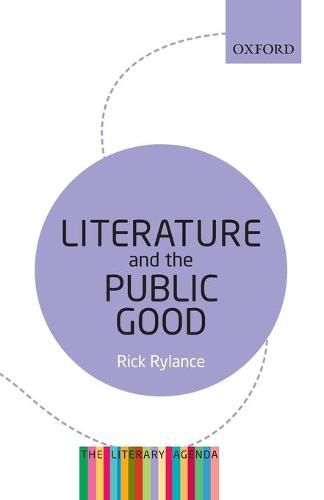Readings Newsletter
Become a Readings Member to make your shopping experience even easier.
Sign in or sign up for free!
You’re not far away from qualifying for FREE standard shipping within Australia
You’ve qualified for FREE standard shipping within Australia
The cart is loading…






Rick Rylance addresses the debate over the public value of literary studies in a book which starts from the widely-remarked predicament of the humanities in modern times. By comparison with science, technology, engineering, and mathematics, the humanities can be negatively characterised as at best optional extras; at worst, frivolous and wasteful. Funders and policy-makers can question their value in terms of utility, vocational prospects and intrinsic worth, while journalists and commentators predict extinction.So what is the justification for literature at the present time? Rylance argues that literature’s value lies in its enormous public presence and its contribution to the public good. Far from being apologetic for our investment in literature, he argues for its value to all parts of our society from economic productivity to personal and social wellbeing. He examines discussion of literature’s public role over time, taking in key moments of self-reflection such as Sir Philip Sidney’s ‘Defense of Poesy’ (1581) and work by John Mill and Ruskin. He reviews current arguments about how culture creates value: from the idea of ‘public goods’ in economics to the value of reading for social consciousness in cognitive psychology. The book makes strong claims for the importance and urgency of reading literature today.
$9.00 standard shipping within Australia
FREE standard shipping within Australia for orders over $100.00
Express & International shipping calculated at checkout
Rick Rylance addresses the debate over the public value of literary studies in a book which starts from the widely-remarked predicament of the humanities in modern times. By comparison with science, technology, engineering, and mathematics, the humanities can be negatively characterised as at best optional extras; at worst, frivolous and wasteful. Funders and policy-makers can question their value in terms of utility, vocational prospects and intrinsic worth, while journalists and commentators predict extinction.So what is the justification for literature at the present time? Rylance argues that literature’s value lies in its enormous public presence and its contribution to the public good. Far from being apologetic for our investment in literature, he argues for its value to all parts of our society from economic productivity to personal and social wellbeing. He examines discussion of literature’s public role over time, taking in key moments of self-reflection such as Sir Philip Sidney’s ‘Defense of Poesy’ (1581) and work by John Mill and Ruskin. He reviews current arguments about how culture creates value: from the idea of ‘public goods’ in economics to the value of reading for social consciousness in cognitive psychology. The book makes strong claims for the importance and urgency of reading literature today.